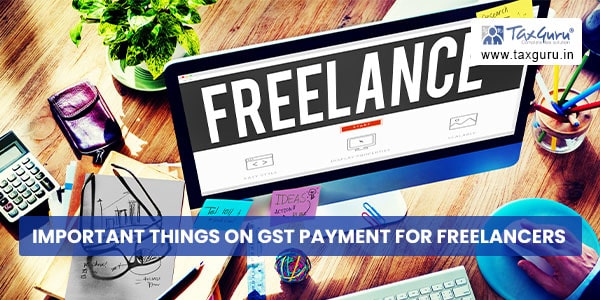The GST has established a unified rule across the country, whether it is for major corporations or small and medium-sized businesses. It has an impact on everyone, whether directly or indirectly.
Freelancers are self-employed individuals who work on a variety of projects. They work on particular jobs on a contract basis and are paid a contract fee.
The term makes it obvious that a freelancer is a service provider, and the regulations that apply to service providers also apply to him.
As there are lots of pros and cons of GST, we will advise you to read this article till the end.
When is a freelancer eligible to apply for GST?
We know that mandatory registration is required under the GST law in the following circumstances:
- Company is considered profitable When the turnover reaches Rs. 20 lacs
- When the turnover reaches Rs. 10 lacs, the company is considered profitable
- For services covered by OIDAR (Online Information and Database Access and Retrieval),
- In the case of service exports, any inter-state supply of goods/services necessitates GST registration. Under the IGST Act, the export of services is referred to as “zero-rated supplies” and qualifies as an “inter-state supply.”
Rules:
The following are some rules that apply to people who provide service to a single client or multiple.
- Voluntary registration
Even if a person’s annual sales are less than Rs 20 lakh / Rs 10 lakh, he or she can register for GST (in northeastern states).
If a person registers voluntarily, he will be subject to all of the GST regulations. In other words, he must collect and pay GST, as well as file returns and other paperwork.
When a person has a lot of costs that are subject to GST, it’s a good idea to register voluntarily.
- GST rate for freelancing
The GST rate for the following is 18%. Here are various types of GST:
1. Accounting/Bookkeeping
2. Call center or customer care
3. Data entry
4. Designing services
5. Software/App Development
6. Technical services
7. Language Translation
8. Management/Consultancy Services
9. Marketing Services
10. Domain and hosting
11. Voice over
- Export of services
If you have submitted a Letter of Undertaking for the export of services, you are not obligated to charge GST (LUT).
If you haven’t submitted a LUT, you’ll have to charge GST and then complete GST Refund forms to get a refund of the GST you paid.
LUT is a relatively basic form that does not require many details, thus it is recommended that you submit LUT rather than requesting a refund.
- Composition scheme
A turnover of less than Rs. 50 lakhs of companies, there is a composition program. In this plan, you can pay GST at a rate of 6% instead of the actual GST rate on the service you offer (which is usually 18%), but you cannot claim the input tax credit.
You also cannot register under the composition scheme if you supply services to someone in another state or nation.
- Input tax credit
The amount of GST paid on purchases that are allowed as a reduction from the GST owing to the government is known as an input tax credit.
For freelancers, there are no particular provisions for the input tax credit. They can claim GST paid as an input tax credit on all company expenses, such as rent, phone bills, computers, and laptops, except for those items that are not eligible for ITC, such as motor vehicles and food bills.
- Tax collection at source under GST
E-commerce firms are obligated to collect TCS from those selling products or services via them under Section 52 of the CGST Act.
For a freelancer based in India, it is required to collect TCS at a rate of 1% on all payments made via them. It is, however, only necessary to be collected from GST-registered individuals.
Upwork also collects 1% TCS from all freelancers, regardless of whether or not they are GST registered.

Frequently asked Questions (FAQ)
Q1. How can a freelancer get a GSTN in India?
The GSTN for the freelancer can be achieved by registering under GST on gst.gov.in. Also, if you are already registered but not able to log in, try to change your email address in the portal.
Q2. Does the Freelancer need to pay GST?
Under the existing Goods and Services Tax (GST) legislation, everybody who provides taxable services must register from the beginning, regardless of where they provide such services. Based on the nature of the services offered, the GST rate applicable to any other service provider (which is normally 18%) would also apply to such freelancers.
Q3. Do freelancers pay tax in India?
Yes
Q4. Do freelancers need a business license in India?
No, if you earn below 20 lakh
Q5. What is the GST rate for freelancers?
18%, also depends on the nature of service.
Conclusion
Freelancers work on many projects for various clients at the same time. Because a freelancer is not an employee of any organization, he or she is not covered by the employer’s benefits or perks.
Under the existing Goods and Services Tax (GST) legislation, everybody who provides taxable services must register from the beginning, regardless of where they provide such services.
Based on the nature of the services offered, the GST rate applicable to any other service provider (which is normally 18%) would also apply to such freelancers.




